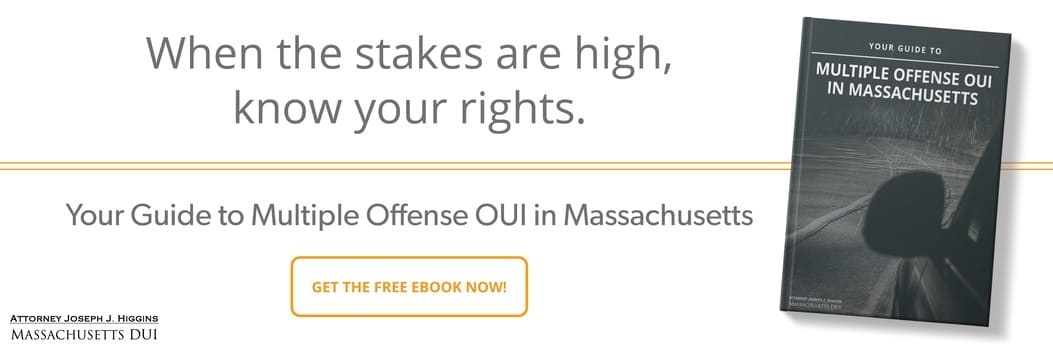Second Offense DUI is a misdemeanor in Massachusetts. Any subsequent DUI offense is a felony under Massachusetts law. While every DUI charge includes the possibility of jail time, first and second offenders do not typically serve time in jail.
Massachusetts has some of the strictest DUI/OUI/DWI laws of any state, but there are significant differences between the penalties and classifications of each DUI offense and what makes multiple DUIs a felony in the state.
First and second DUI offenses are misdemeanors in Massachusetts.
Misdemeanors are typically punished with community service, fines, and probation, but they may also include jail time depending on the charge. Jail time is possible with any DUI charge, but most people charged with a first or second DUI do not serve time in jail.
Any subsequent DUI offense after the second is a felony. A misdemeanor DUI may become a felony if the charges involve the serious bodily injury or death of another person.
In conjunction with other penalties, each felony DUI charge involves a minimum jail sentence:
- Third DUI: 180 days minimum
- Fourth DUI: 2 years minimum
- Fifth DUI: 2.5 years minimum
Most jail sentences are served as a “split sentence,” which means only part of the time is served incarcerated. The remaining balance is suspended while you serve probation. You must serve a minimum amount of time before you are eligible for probation.
If you are facing felony DUI charges, you should consult a lawyer as soon as you can. The stakes are high. If convicted, you will serve jail time.
Second Offense DUI is a Misdemeanor
If you’re convicted a second DUI offense, you face the following maximum penalties:
- A fine of $600 to $10,000
- Imprisonment of 60 days to 2.5 years
- 2-year loss of driver’s license
You also face an additional license suspension of 3 years if you refused to take a breathalyzer.
Most Second Offense DUI cases do not result in a jail sentence, but it can’t be ruled out completely. You may qualify for an alternative disposition that involves probation, an inpatient alcohol treatment program, and outpatient aftercare.
An experienced DUI attorney will review the facts of your case and advise you on whether you should fight your charges or attempt to qualify for this alternative disposition. If you choose to fight your charges, your attorney will argue in your defense, protect your rights, and attempt to obtain a verdict of not guilty.
Third Offense DUI is a Felony
If you’re convicted of a third DUI offense, you face the following maximum penalties:
- A fine of $1,000 to $15,000
- Imprisonment for 180 days to 2.5 years
- Incarceration in state prison for 2.5 years to 5 years (if prosecuted in Superior Court)
- 8-year loss of driver’s license
You also face an additional license suspension of 5 years if you refused to take a breathalyzer.
With Third Offense DUI and any subsequent offenses, there is little incentive in pleading/admitting because of the minimum jail sentences. It’s almost always in your interest to fight the charges. Fourth and fifth offenses have extremely harsh penalties, including multiple years of jail time. The ramifications of a felony DUI conviction are significant and can impact your entire life.
If you’ve been charged with felony DUI, contact a Massachusetts DUI attorney to review your case. Your attorney can protect your rights and defend you at trial. Depending on the facts of your case, your attorney will attempt to obtain a verdict of not guilty.



